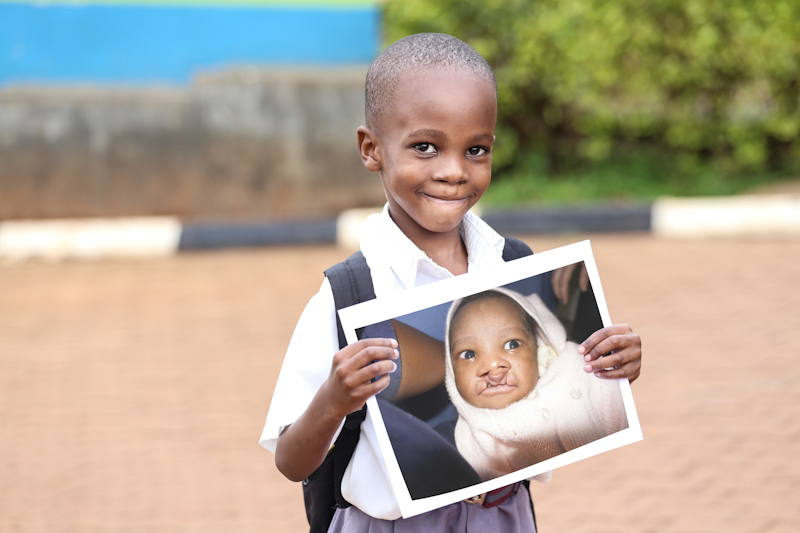As the world commemorated Universal Health Coverage on 12th December 2021, it is commendable that strides are being achieved, most notably the countrywide rollout in Kenya of UHC. However, persons with cleft are still being left behind in accessing safe, quality and timely care.
The commemoration for this year was themed; “Leave no one’s health behind; invest in the health system for all” everybody’s future depends upon a resilient health system for all. It is, therefore, time for us to call on the government of Kenya during this day to pay attention to the needs of children with cleft lip and palate and to ensure this category of children as we walk through the UHC journey/people are not left behind.
Cleft is a congenital birth defect that affects the child’s ability to breathe, eat, speak and ultimately thrive. Because of the unfounded myths and misconceptions, children are isolated, stigmatized and abandoned or in some communities, even killed.
It is difficult to imagine living with an untreated cleft and the associated physical challenges and mental trauma, simply because they were unaware that treatment is available. These are missed opportunities to make friends or even go to school and secure a healthy, productive future because of societal judgement at face value.
The management of the birth difference is made more difficult due to the ‘‘late’’ diagnosis of cleft and the lack of resources to enable prompt management.
Every three minutes, a child is born with a cleft somewhere in the world, totalling an estimated figure of more than 200,000 globally and over 39,000 from Africa. There is, therefore, a need to strengthen surgical systems that prioritize safe, timely and sustainable care for patients with a cleft.
Health CSOs in Kenya, under the umbrella of Health NGOs Network (HENNET) conducted UHC consultations in July 2021. The findings demonstrated that such marginalized groups are often left behind (National Consultation on UHC – Kenya, held on 15th July 2021.
Several factors, including lack of access to information regarding the available services, stigma, lack of Human Resources for Health (HRH), finances, infrastructure, commodities, insufficient policies and legislative frameworks, hinder cleft lip and palate children from accessing Universal Health Care (UHC) services.
The COVID-19 Pandemic unveiled that mission models are unsustainable in delivering quality care to children. This is coupled with the lack of necessary follow-up care for the patient to thrive.
To create more robust surgical systems, Smile Train has been working with 22 partner hospitals in Kenya, 4 of which are public health facilities- Makueni County Referral Hospital, Meru Teaching and Referral Hospital, Moi Teaching and Referral Hospital, Nyeri County Referral Hospital and Embu County Referral Hospital. Patients with a cleft are not only able to receive free cleft surgery but also comprehensive care, including nutrition care and speech therapy treatment all year round.
Smile Train offers training to the diverse professionals within the cleft ecosystem, empowering them to care for all patients to address the need for strengthening human resources for health.
The vision of the development partners feeds into the Government of Kenya’s vision in achieving various goals, including moving closer to the optimum ratio of 23 health workers per 10,000 population (WHO) by steadily increasing it from the current ratio of 10 health workers per 10,000 populations to 13 health workers per 10,000 populations and reduction of out of pocket expenditure from the current 32% to 20% of household expenditure per year by 2022.
As we pat ourselves on the back on the strides achieved, we still look ahead at the journey and call for more investments within the health systems, including health promotion and disease prevention; treatment of pathologies and reduction of premature deaths; providing care for people with chronic diseases, deficiencies, disabilities, or health-related handicaps; chronic illness care; the provision and administration of public health care; provision and management of public health care; taking steps to develop health programs, health insurance and other mechanisms of financing, and the administration of the health system.
Civil Societies should continue to keep the government accountable at the local and national level calling for more investment in Primary Health Care infrastructure and human resources involved as a driver of UHC. We need the government to support those unable to afford the NHIF scheme to be considered and prioritized. In equal measure, Civil Society Groups could help the public in advocacy efforts by encouraging NHIF contributions that would also contribute to the financing of UHC efforts.
No child should live with an untreated cleft. Equally, let us all play our part in creating resilient health systems that benefit all Kenyans.
This opinion has been written jointly by Dr Mercy Onsando (Chief Executive Officer, HENNET Kenya) & Mrs Jane Ngige-Muturi (Program Director East Africa, Smile Train).




